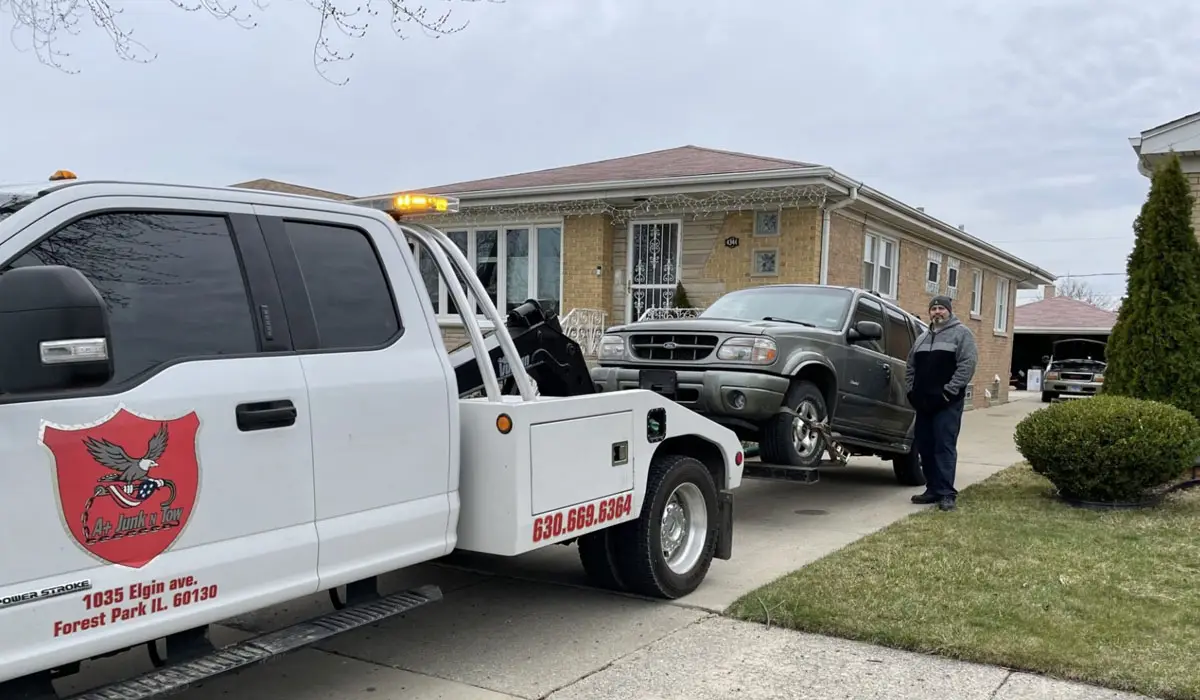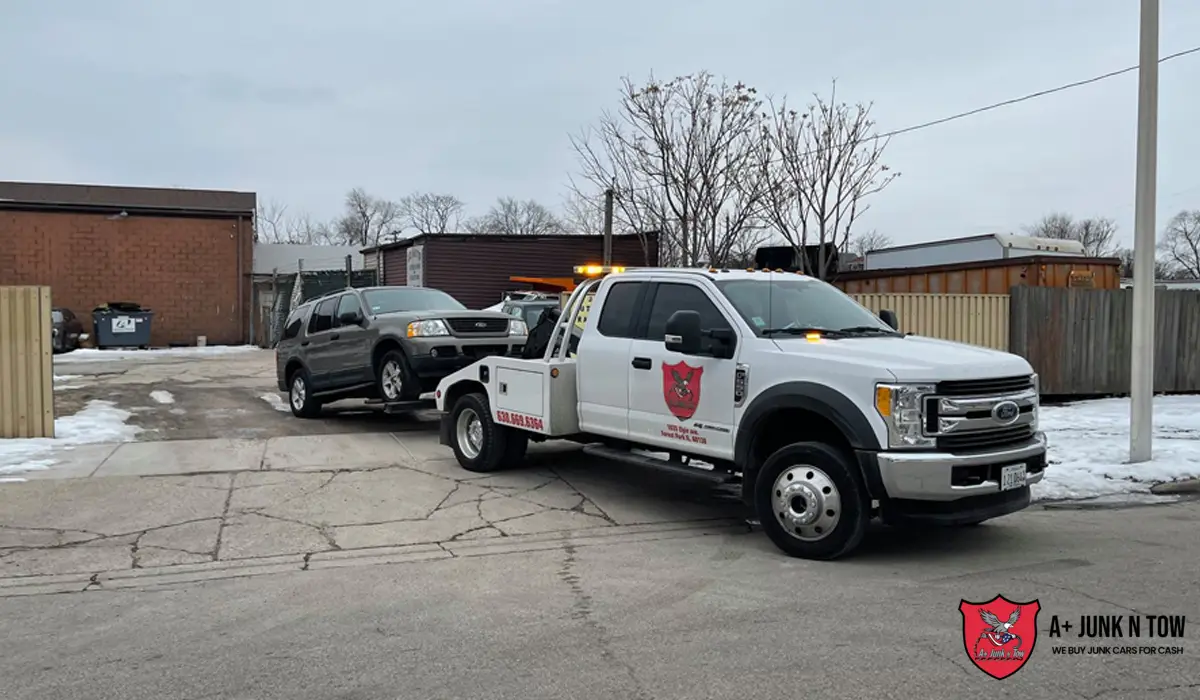Cash In On Clunkers: Spotting The Moment Your Car Becomes A Junk Vehicle

Cash In On Clunkers: Spotting The Moment Your Car Becomes A Junk Vehicle
Maximize Profits: Recognizing Your Junk Vehicle's Perfect Selling Time
Every car owner faces the inevitable question: When has my vehicle transitioned from a reliable mode of transport to junk? Recognizing when your car has reached its “sell-by date” can be a challenge, but it’s an essential step in maximizing its residual value. At A+ Junk N Tow, we’re here to guide you through this decision, ensuring you get the best outcome. Explore how you can get cash for your junk car. Our reviews showcase the experiences of car owners just like you. And for any burning questions, our FAQs have got you covered. Take the first step towards a clutter-free driveway and a wallet boost; call (708) 968-2505 and secure a free estimate today.
Spot The Clues: Is Your Car Turning Into A Junk Vehicle?
Determining when a vehicle transitions from being a reliable mode of transportation to being considered “junk” can be a bit subjective. However, there are clear indicators that can guide this decision:
• Consistent Mechanical Failures
If your vehicle frequently breaks down or requires constant repairs, it might signal its end of life. Regular visits to the mechanic drain your wallet and indicate underlying issues that might be too costly or complex to address.
• Safety Concerns
Over time, essential safety components of a vehicle can degrade. If your car has issues like a rusted frame, malfunctioning brakes, unreliable airbags, or compromised structural integrity, it’s not just a junk candidate but a potential hazard on the road.
• Obsolete Parts
For older car models, finding replacement parts can become a challenge. Maintenance of the vehicle becomes impractical if repairs require parts that are out of production or hard to come by.
• Deteriorating Exterior And Interior
Visible signs of wear and tear, such as significant rust patches, damaged interiors, or a compromised exterior, can reduce the vehicle’s value and aesthetic appeal. While cosmetic issues might seem superficial, they can indicate deeper structural problems.
• Poor Fuel Efficiency
A significant drop in fuel efficiency can indicate underlying mechanical problems. If you find yourself refueling far more often than you used to, despite similar driving habits, your car’s performance is likely deteriorating.
• Excessive Emissions
Cars that emit excessive smoke or pollutants harm the environment and indicate potential engine or exhaust system issues. If your vehicle fails emission tests or leaves behind a trail of smoke, it’s a clear sign of declining health.
• High Mileage
While many modern cars are built to last well beyond 100,000 miles, a high mileage combined with other issues can be a sign that the vehicle is nearing its end of life. The wear and tear can be significant, especially if those miles have been hard-driven.
By recognizing these signs early, car owners can decide whether to invest in repairs or consider selling their vehicle as junk. This proactive approach ensures safety, saves money in the long run, and can provide a financial boost if the car is sold for cash.

4 Basic Tips Before Getting Rid Of Your Junk Car
Selling a junk vehicle is about more than just handing over the keys and collecting cash. To ensure a smooth process and maximize the value you get from your old car, consider the following essential steps:
1. Do A Thorough Check/Clean
Over the years, vehicles tend to become repositories for personal items and important documents. Before saying goodbye to your car, inspect every nook and cranny. Check glove compartments, under seats, trunks, and even sun visors. Retrieve all personal belongings, especially essential documents like old insurance cards or service records. Cleaning the vehicle might also reveal hidden damages or parts that could add to its value.
2. Maximize Value With Parts
Some components of your car might still be in good condition and can fetch a decent price if sold separately. Items like GPS systems, custom wheels, sound systems, or even certain engine parts can be valuable. Consider removing and selling these parts individually, especially if they’re in high demand or need help to come by.
3. License Plate Removal
This step is not just about procedure but also about legal implications. In many jurisdictions, the license plate is associated with the owner, not just the vehicle. Before handing over your car, ensure you remove the license plates. This action will also be necessary if you plan to cancel the vehicle’s registration or insurance.
4. Fuel Utilization
It’s common to overlook the value of the fuel left in a junk car. If there’s a significant amount of fuel in the tank, consider using a siphon pump to transfer it to another vehicle. This step saves money and ensures the fuel is not wasted. Remember, the fuel can be valuable even if the engine isn’t running. However, exercise caution and use safe methods to extract fuel.
By following these tips, car owners can confidently navigate the process of selling their junk vehicle, ensuring they get the best value and experience a seamless transaction.
Junk Car Or Repairable Ride? Making The Right Choice
Every vehicle, no matter how cherished, reaches a point where continuous repairs become a financial burden rather than a wise investment. Recognizing this tipping point is essential, as it can save car owners from sinking money into a depreciating asset. The challenge lies in distinguishing between routine maintenance and signs of a car nearing its end of life.
When repair costs start to approach or surpass the vehicle’s current market value, it clearly indicates that the car might be on its last legs. Frequent breakdowns, the need for rare or expensive parts, and consistent issues even after repairs are red flags. Moreover, if safety becomes a concern due to compromised vehicle integrity, no amount of repair is worth the risk.
Understanding this balance is crucial for financial prudence and personal safety. Instead of pouring money into a car past its prime, investing in a newer, more reliable vehicle might be more economical. By doing so, car owners can ensure consistent transportation, reduce unexpected repair costs, and enjoy the peace of mind that comes with a dependable vehicle.
Unlocking The Hidden Worth Of Your Junk Vehicle
The term “junk car” might imply something worthless, but even a vehicle no longer roadworthy has intrinsic value. Various factors, including the car’s make, model, age, and condition, influence this value. Even if it’s not in running order, the metals, parts, and components within the car can be repurposed or recycled, adding to its worth.
Junkyards, recycling centers, and specialized buyers are often interested in the vehicle’s type and amount of metal, such as aluminum, steel, and titanium. These materials are highly recyclable and valuable in various industries. Additionally, parts like engines, transmissions, or custom accessories might fetch a higher price if they’re in good condition.
Understanding the value of a junk car empowers owners to make informed decisions when selling. By recognizing the potential worth in what might seem like a worthless vehicle, they can negotiate better deals and turn an old car into a financial asset. It’s a process that benefits the car owner and contributes to sustainable practices by promoting recycling and repurposing.
Conclusion
Deciding when your trusty vehicle has become more of a liability than an asset is pivotal for every car owner. Recognizing the signs and understanding the value that even a junk car holds can pave the way for a profitable decision. WithA+ Junk N Tow, you’re not navigating this journey alone. Curious about the potential cash waiting for you? Get a no-obligation free estimate now. Learn how to get cash for your junk car. Our commitment to transparency and customer satisfaction shines through in our reviews. And if there’s a question we still need to answer, our FAQs are here to help. Don’t let that old car gather dust; make the call that could boost your bank balance. Contact us at (708) 968-2505 and let’s turn that vehicle into value.
A+ Junk N Tow Offers Services As Follows:
Especially Selected Articles:
Frequently Asked Questions
While having the keys can increase the value, many buyers will still purchase vehicles without them, especially if the car is being sold for parts or scrap.
Selling a car in parts can sometimes yield more money but requires more effort and time. Selling it whole is quicker and more convenient.
While it’s not always necessary, many buyers prefer the owner to be present during pickup to handle any last-minute questions and complete the sale.
Always deal with reputable buyers, avoid accepting checks or money orders, and only agree to a sale after receiving payment first.
Generally, newer cars or those with more in-demand parts can fetch a higher price than older models.
Yards typically dismantle cars and sell parts, while scrapyards focus on melting the cars for metal. However, the terms are often used interchangeably.
Yes, even cars damaged by flood or fire have value, especially for their metal content. However, the price might be lower than that of a car in better condition.
Selling a car with an outstanding loan can be tricky. The loan needs to be cleared, or you must obtain permission from the lender.
Clear out personal items, terminate the insurance, and gather all necessary paperwork. If there are valuable components, you might consider selling them separately.
Depending on the buyer and the condition of your car, the process can range from a few days to a week.
Cash In On Clunkers: Spotting The Moment Your Car Becomes A Junk Vehicle Read More »

